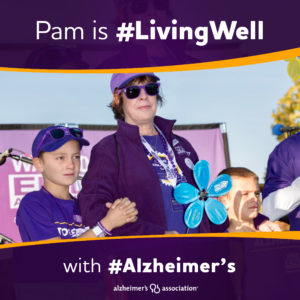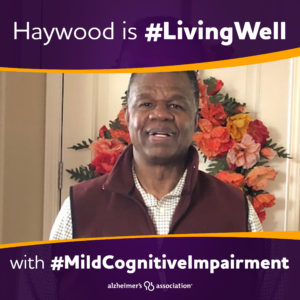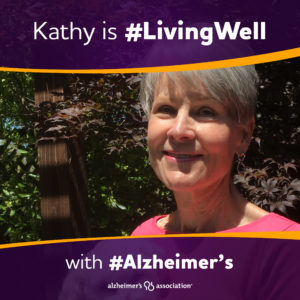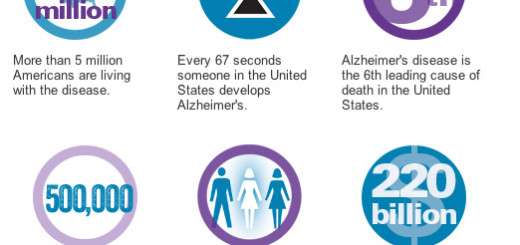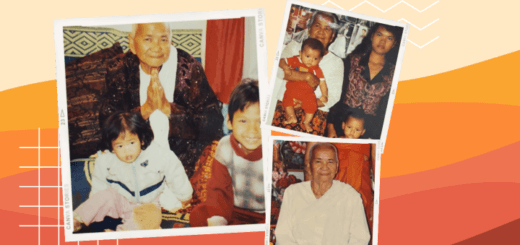Individuals share tips for #LivingWell with Alzheimer’s or other dementias
Those living with Alzheimer’s and other cognitive impairments provide encouragement to others.
Many individuals living with Alzheimer’s disease and other cognitive impairments find ways to live well after their diagnosis. Pam Montana, one of our volunteers who is living with younger-onset Alzheimer’s, suggested that we start a campaign. She encouraged us to show how people are living with Alzheimer’s.
Since June is Alzheimer’s & Brain Awareness Month, it seemed like the perfect time to launch the campaign. Throughout this month (and beyond), we will share suggestions and tips from Pam and others in our region who are #LivingWell. We will highlight those living with Alzheimer’s, other forms of dementia and mild cognitive impairment.
We asked several individuals what advice they would give to someone who is concerned about their cognitive health or has recently been diagnosed with Alzheimer’s or another dementia. They provided great suggestions.
Get a clear diagnosis
“Don’t ignore your symptoms. The earlier you receive a proper diagnosis, the better your life will be while you’re going through it.” – Cris, #LivingWell with younger-onset #Alzheimers for three years
“Seek the advice of your primary care physicians and specialists.” – Haywood, #LivingWell with #MildCognitiveImpairment for five years
“If your doctor tells you that you have dementia, make sure to ask what type it is. Dementia is a broad term, like ice cream. You want to know what “˜flavor’ of dementia you have. They are not all the same.” – Steven, #LivingWell with #ChronicTraumaticEncephalopathy for six years
Find support from others who understand
“Reach out to the Alzheimer’s Association immediately! Get involved. Understand what’s next and don’t be afraid.” – Pam, #LivingWell with younger-onset #Alzheimers for two years
“You are not alone. Find a face-to-face, telephone, online or video chat support group of others who are also in the early stage of the disease.” – Steven, #LivingWell with #ChronicTraumaticEncephalopathy for six years
Plan for the future
“Get your affairs in order and complete or update legal documents (e.g., will, trust, financial and healthcare powers of attorney). You won’t have to worry about it later. Make sure you are very clear with your family about your end of life wishes. Write down and share whatever specifics are important to you. Try to make it easy for others when you will not be able to take care of yourself or make important decisions.” – Pam, #LivingWell with younger-onset #Alzheimers for two years
Focus on what you enjoy
“Take time to mourn the loss. Accept that things will change. Re-prioritize your life vision. Relax and try to enjoy what you can do.” – Kitty, #LivingWell with #MildCognitiveImpairment for over four years
“There is no reason to be ashamed of having Alzheimer’s. Live in the present. We could all benefit from slowing down, taking a breath and appreciating what we do have.” – Cris, #LivingWell with younger-onset #Alzheimers for three years
“Don’t give up. Keep doing what you love for as long as possible.” – Kathy, #LivingWell with #Alzheimers for four years
Consider participating in research studies
“One of the ways you can help out is with clinical trials. It’s important that we help with research to find a cure. I was recently accepted into a clinical trial.” – Steven, #LivingWell with #ChronicTraumaticEncephalopathy for six years
Look for opportunities to give back
“Attending the Alzheimer’s Association support group helped me get more focused. I love dogs, so I became a volunteer at the Humane Society.” – Cris, #LivingWell with younger-onset #Alzheimers for three years
Many of the individuals who provided comments for this piece also volunteer for the Alzheimer’s Association. They share their story at the Walk to End Alzheimer’s and other events. They join advocacy teams and speak with their legislators. They write their own blogs or speak with reporters.
Follow our #LivingWell campaign
Check out our Facebook, Instagram and Twitter accounts to see the #LivingWell posts. We appreciate all who have shared their stories and tips for this project.
We hope that you will share the posts so we can reach more people and reduce some of the stigma that still exists. If you would like to participate in the project, you can submit your information at bit.ly/livingwellform or contact Michelle Johnston at mjohnston@alz.org.
Learn more:





